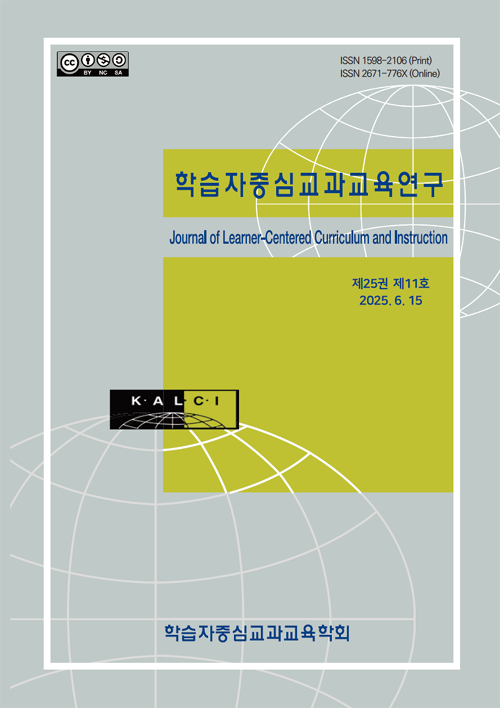- 영문명
- The Relationship between Avoidant Attachment and Interpersonal Problems: The Sequential Mediating Effects of Internalized Shame and Cognitive Flexibility
- 발행기관
- 학습자중심교과교육학회
- 저자명
- 안지은(Jieun An) 김승윤(Seungyun Kim) 최현주(Hyunju Choi)
- 간행물 정보
- 『학습자중심교과교육연구』제25권 11호, 483~498쪽, 전체 16쪽
- 주제분류
- 사회과학 > 교육학
- 파일형태
- 발행일자
- 2025.06.15

국문 초록
목적 본 연구는 성인애착회피와 대인관계문제 간 구조적 관계를 규명하고자 하였다. 특히, 성인애착회피가 내면화된 수치심과 인지적 유연성을 통해 대인관계문제에 미치는 영향을 탐구하며, 내면화된 수치심과 인지적 유연성의 순차적 매개효과를 검증하는 데 초점을 맞추었다.
방법 만 19세 이상의 일반 성인 300명을 대상으로 성인애착회피(ECR-R), 내면화된 수치심(ISS), 인지적 유연성(CFI), 대인관계문제(KIIP-SC) 척도를 활용하여 설문조사를 실시하였다. 수집된 자료는 SPSS 26.0을 이용해 분석하였으며, 연구모형 검증은 AMOS 25.0를 사용하여 수행하였다.
결과 첫째, 성인애착회피가 내면화된 수치심과 대인관계문제에 이르는 경로는 통계적으로 유의했으나, 인지적 유연성에 이르는 경로는 유의하지 않았다. 둘째, 내면화된 수치심이 인지적 유연성과 대인관계문제에 이르는 경로는 모두 통계적으로 유의했다. 셋째, 내면화된 수치심은 성인애착회피와 대인관계문제 간 관계를 부분매개 하였다. 넷째, 내면화된 수치심은 성인애착회피와 인지적 유연성 간 관계를 완전매개 하였다. 다섯째, 인지적 유연성은 내면화된 수치심과 대인관계문제 간 관계를 부분매개 하였다. 여섯째, 성인애착회피와 대인관계문제 간 구조적 관계에서 내면화된 수치심과 인지적 유연성의 순차적 매개효과가 확인되었다.
결론 회피형 애착으로 인해 대인관계문제를 경험하는 개인을 조력하기 위해서는 내면화된 수치심과 인지적 유연성에 중점을 두는 개입이 필요하다. 본 연구는 정서적 요인인 내면화된 수치심이 인지적 요인인 인지적 유연성에 영향을 미쳐 결과적으로 대인관계문제로 이어질 수 있음을 검증하였다. 이를 통해 정서와 인지 요인을 통합적으로 다루는 접근이 내담자의 행동 문제 해결에 효과적임을 시사한다.
영문 초록
Objectives The present study aimed to examine the structural relationship between adult attachment avoidance and interpersonal problems, focusing on the sequential mediating roles of internalized shame and cognitive flexibility.
Methods A total of 300 Korean adults participated in this study, completing measures assessing adult attachment avoidance (ECR-R), internalized shame (ISS), cognitive flexibility (CFI), and interpersonal problems (KIIP-SC). Data were analyzed using SPSS 26.0 and AMOS 25.0.
Results First, adult attachment avoidance was positively associated with internalized shame and interpersonal problems but was not directly related to cognitive flexibility. Second, internalized shame exhibited a significant negative association with cognitive flexibility and a positive association with interpersonal problems. Third, cognitive flexibility was negatively correlated with interpersonal problems. Fourth, structural equation modeling (SEM) revealed that internalized shame partially mediated the relationship between adult attachment avoidance and interpersonal problems. Fifth, internalized shame fully mediated the relationship between adult attachment avoidance and cognitive flexibility. Sixth, the sequential mediation effect of internalized shame and cognitive flexibility in the relationship between adult attachment avoidance and interpersonal problems was confirmed.
Conclusions These findings suggest that individuals with higher attachment avoidance may experience interpersonal difficulties due to heightened internalized shame and reduced cognitive flexibility. This study highlights the importance of addressing both emotional (internalized shame) and cognitive (cognitive flexibility) factors in counseling interventions for individuals experiencing interpersonal problems related to attachment avoidance.
목차
Ⅰ. 서론
Ⅱ. 연구 방법
Ⅲ. 결과
Ⅳ. 결론 및 논의
참고문헌
키워드
해당간행물 수록 논문
참고문헌
최근 이용한 논문
교보eBook 첫 방문을 환영 합니다!

신규가입 혜택 지급이 완료 되었습니다.
바로 사용 가능한 교보e캐시 1,000원 (유효기간 7일)
지금 바로 교보eBook의 다양한 콘텐츠를 이용해 보세요!


